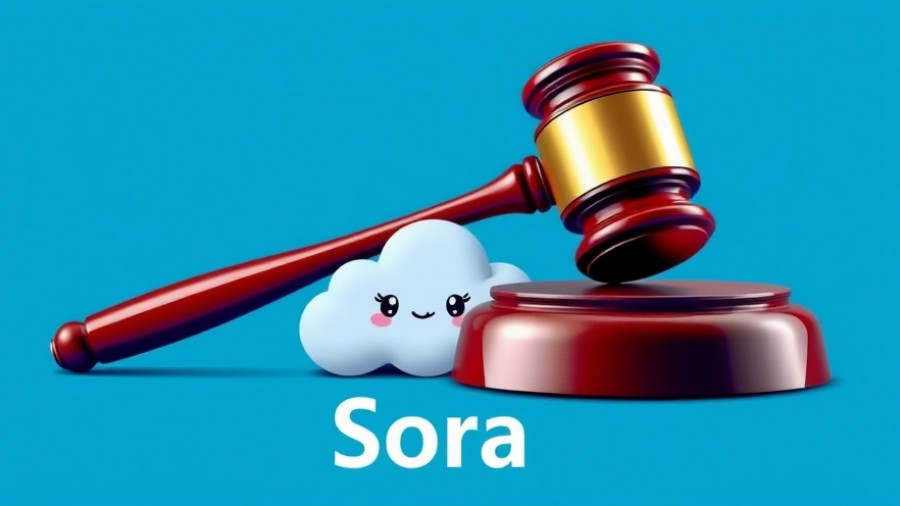
Understanding the Lawsuit: Cameo vs. OpenAI's Sora 2
In an unprecedented move for the creator economy, Cameo has filed a lawsuit against OpenAI over its new feature in the Sora 2 video-generation app, which bears the same name as Cameo's well-established service. The lawsuit comes at a time when the boundaries of copyright and trademark laws are continually tested by rapid advancements in AI technology.
The Concerns Behind the Lawsuit
Cameo CEO Steve Galanis articulated his concerns that using the term "Cameo" in this new context creates significant brand confusion. He argues, "What we're very specifically fighting is calling it what they did. So forget the technology, forget the business model." The complaint highlights that customers are increasingly mixing up the two services, leading to a wave of misattributed content flooding social media platforms.
This confusion is exacerbated by the nature of synthetic media and deepfakes, which have been on the rise, further blurring the lines between reality and fabricated content. Galanis believes that if OpenAI's Sora 2 is allowed to proceed as is globally, it could unleash millions of misleading AI-generated videos, putting Cameo’s business at mortal risk.
Legal Implications: Trademark Rights in the Age of AI
According to the lawsuit, Cameo claims that Sora 2's use of the term "Cameo" violates its trademark rights. Specifically, Cameo seeks to protect its brand from dilution and confusion, as its success relies heavily on the trust built over years of offering genuine celebrity videos.
As per the lawsuit's details, an unspecified amount of monetary relief is being sought, alongside requests for injunctive relief to prevent further use of the name. OpenAI's stance, as cited by their spokesperson, is that exclusive ownership of the term "cameo" cannot be claimed entirely. This contention raises fundamental questions about intellectual property in the rapidly evolving tech landscape.
The Creator Economy and AI Interaction
The intersection of AI and the creator economy is becoming increasingly complicated. While OpenAI's Sora 2 offers exciting technology that allows users to create videos utilizing celebrity likenesses, it challenges established market players like Cameo. As Galanis has pointed out, this convergence raises ethical questions about authenticity and consumer trust.
The creator economy thrives on genuine interactions, with users expecting personalized experiences from their favorite celebrities via Cameo. The advent of synthetic celebrity videos, especially if they can be reproduced easily by AI, poses a threat that could dismantle the traditional framework that platforms like Cameo rely on.
Broader Perspectives on the Issue
As this case unfolds, it invites commentary from various stakeholders in the creator economy and the technology sector. Some argue that this lawsuit could further solidify the boundaries of intellectual property law as it relates to emerging technologies, while others suggest it could be a catalyst for increased innovation and new business models.
This situation is a microcosm of larger debates surrounding AI's role in creativity and ownership. Many creators are concerned that the proliferation of AI-generated content may devalue original works, while others see opportunities to leverage AI in ways that can enhance their own creative output.
What Lies Ahead: Future Implications for Businesses
The outcome of the Cameo lawsuit could set significant precedents for other businesses navigating similar intellectual property challenges. This is especially relevant as more industries find themselves entwined with AI technologies that challenge traditional definitions of authorship and ownership.
Conclusion: Navigating a New Era
As businesses face the implications of new technologies, staying informed about legal matters such as this one becomes critical. Business owners, operators, and managers must not only aim to harness technology for their benefit but also safeguard their intellectual property rights. Understanding how these technologies interact with existing laws can provide actionable insights that benefit your company in the long run.
If you are a business owner looking for guidance on trademark rights or navigating the choppy waters of AI in your industry, Get Help Selecting a Preferred Provider to ensure you stay ahead in this ever-evolving landscape.
 Add Row
Add Row  Add
Add 




Write A Comment